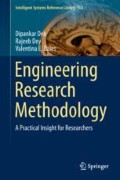Abstract
Ethics generally refers to a set of rules distinguishing acceptable and unacceptable conduct, distinguishing right from wrong, or wise aphorisms like the sayings of Chanakya. Most people learn such norms in their formative years [1], but moral development continues through different stages of growth. Although everyone recognizes some common ethical norms, but there is difference in interpretation and application. Ethical principles can be used for evaluation, proposition, or interpretation of laws [2]. Although ethics are not laws, but laws often follow ethics because ethics are our shared values.
Access this chapter
Tax calculation will be finalised at checkout
Purchases are for personal use only
Notes
- 1.
Chanakya was a fourth-century Indian teacher, philosopher, and royal advisor, who authored the political treatise, Arthashastra. He is regarded as a pioneer in politics, ethics, and economics.
- 2.
A commonly used tool among researchers is iTheticate: http://www.ithenticate.com/.
References
Swazey, J. P., Louis, K. S., & Anderson, M. S. (1994) The ethical training of graduate students requires serious and continuing attention. Chronicle of Higher Education.
Swazey, J. P. (1993). Ethical problems in academic research. American Scientist, 542–553.
Nuremberg Code. (1949). Trials of war criminals before the Nuremberg Military Tribunals under Control Council Law No. 10, (Vol. 2, pp. 181–182). Washington, DC: U.S. Government Printing Office
Whitbeck, C. (1998). Ethics in engineering practice and research. New York: Cambridge University Press.
Martyn, C. (2003). Fabrication, falsification and plagiarism. QJM: An International Journal Of Medicine, 96(4), 243–244.
Zietman, A. (2018). Falsification, fabrication, and plagiarism: The unholy trinity of scientific writing.
Newman, A., & Jones, R. (2006). Authorship of research papers: Ethical and professional issues for short-term researchers. Journal of Medical Ethics, 32(7), 420–423.
Jackson, C. I., & Prados, J. W. (1983). Honor in science. American Scientist, 71, 462–464.
Lock, S. (1995). Lessons from the Pearce affair: Handling scientific fraud. British Medical Journals, 310(6994), 1547-1548.
Jones, A. W. (1996). Some thoughts and reflections on authorship. Alcohol and Alcoholism, 31(1), 11–15.
Altman, L., & Melcher, L. (1983). Fraud in science. British Medical Journal (Clin Res Ed), 286(6383), 25.
Author information
Authors and Affiliations
Corresponding author
Rights and permissions
Copyright information
© 2019 Springer Nature Singapore Pte Ltd.
About this chapter
Cite this chapter
Deb, D., Dey, R., Balas, V.E. (2019). Ethics in Engineering Research. In: Engineering Research Methodology. Intelligent Systems Reference Library, vol 153. Springer, Singapore. https://doi.org/10.1007/978-981-13-2947-0_5
Download citation
DOI: https://doi.org/10.1007/978-981-13-2947-0_5
Published:
Publisher Name: Springer, Singapore
Print ISBN: 978-981-13-2946-3
Online ISBN: 978-981-13-2947-0
eBook Packages: EngineeringEngineering (R0)

